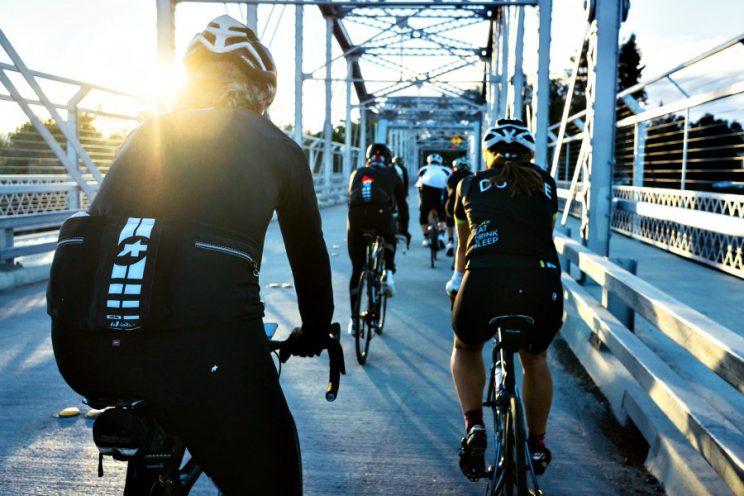We know. Enthusiasm is huge and motivation is maximum for the next season.
However, training too hard, wanting to go too quickly or be inconstant are some of the mistakes that hinder the success of our preparation season.
[IRP Posts = "8769" Name = "The importance of the basis for your next bike challenges"]
Training the base is essential for solid foundations that allow you to succeed during the next season. Therefore, you need to avoid some mistakes when facing your first training of the year. Here we show you some of the most frequent.
Train too hard
In the society in which we live, we glorify hard work. The more a person strives, the more merit and more palmaditas receives on the back. However, in base training, harder it is not always better. In fact, it is rarely.
One of the foundations of base training is to create physiological adaptations that can only be achieved when we work aerobically (or oxygen). These adaptations include, among others, the increase in the amount of blood that the heart can pump by beat, which decreases the heart rate, as well as the increase in capillary density and efficiency, and the increase in blood flow to muscles . It will also increase the size and number of mitochondria, which will provide your body with greater energy availability.

Without going into more depths: when you try more than due during base training, you take away from your body the ability to complete important adaptation phases. Consequently, you run the risk of entering the next training phase with insufficient preparation. Therefore, record it over fire: Do not feel guilty the next time you feel not having worked enough during your bike exit. Remember what your long -term goals are and keep in mind that going slowly also requires discipline.
Go too quickly
As they say, good dishes are cooked over low heat. Something similar happens in cycling training. The organism's adaptations have been useful and it is useless - and even harmful - wanting to advance. The necessary period that must be dedicated to base training varies from one cyclist to another, depending on the objectives and their physical level. In fact, not even elite professional cyclists can skip base training.
Do not fall into the temptation to shorten your base training when you see that a race appears in the early season calendar. One or two weeks in this base phase are not enough to begin to increase the intensity. Ideally, as a general rule, is to spend 8-10 weeks in the base training phase.
Nor should you go to the opposite end. There are cyclists who await too long before adding intensity in their training program. Although developing aerobic resistance is essential in a sport such as cycling, this can be achieved with a well -planned combination of intensities.
Put too much volume
Maybe the following reasoning sounds to you: since I can't squeeze strong, at least, I will put long runs and thus compensate.
It is a very frequent error at the beginning of the base training. It is usual to feel hypermotivated in the face of new challenges and want to break radically with a period of inactivity. There are cyclists who begin with such a high training volume that prevents building found enough solids.

If you begin to put a lot of volume too soon, you run the risk of burning or injuring yourself later, the season and the season. Although there is no fixed rule, physical trainers recommend increasing the weekly volume by no more than 10%.
Often, we fall into the error of obsessing what we have been, instead of focusing on our reality and what we must do to improve. Do not lose a second regretting that your power is not what was, or that your times are infinitely worse. On the contrary: Be realistic with your current physical condition and be aware that it will take some time to recover your state ideally. It will be a matter of time, but you will get it; guaranteed.
Starve
There are those who think that starving is consubstantial to base training. Maybe because we associate ourselves in form with the desire to lose weight. Therefore, many cyclists increase their energy expenditure, while drastically reduce their caloric intake.
But the reality is that training demands a lot of our mind and our body, so to get the most out of your training you need to feed yourself correctly on the bicycle. It is easy to forget about nutrition while traveling kilometers.

Broadly speaking, to obtain optimal performance, it is necessary to consume about 60 g of carbohydrates per hour. A solution is to take a small snack before the route and consume calories only during the routes that last more than 60-70 minutes.
The same goes for hydration: Be sure to consume water or a specific sports drink. Some experienced cyclists program an alarm in their cyclocomputers that sounds every 15 minutes to remind them that they must drink. It may seem nonsense, but it works.
Stop too
The technical stops for resting and taking something are consubstantial to any cyclist exit with the group. We know. However, for too frequently or for too long it can be an obstacle to improvement in your base preparation. Do not forget that one of the objectives of the base training is to increase the resistance, which is achieved more effectively when pedaling without interruption. A punctual stop is fine, but lunch by the King's body in the middle of the route is something that attentive frontally against the performance on the bicycle.
Inconsistency
It will always be preferable to train in small doses constantly over the time than to stick good beatings with a handful of days in between. We usually fall into the temptation to carry out on efforts and then take days, if not weeks, rest for recovery or other obligations. Do not fall into that trap. Instead, plan your training according to the rhythm that you can maintain constantly.

A frequent error is to establish unrealistic and incompatible training schedules with our extra -sports activity. Therefore, a good coach can help you make the most of the time you have to pedal.
Another issue that contributes to inconsistency is to aspire to
recover lost training, doing them all consecutively and in a short period of time. The result, excessive fatigue and bad performance results. It is better to restart where we let it try to compensate.
Conclusion: Don't think about it
Don't you have it clear? Are you not sure you can achieve the goal? That the doubt does not paralyze you. Remember that something is always better than anything, so get on the bike and start pedaling. The rest will arrive on its own.
 Without going into more depths: when you try more than due during base training, you take away from your body the ability to complete important adaptation phases. Consequently, you run the risk of entering the next training phase with insufficient preparation. Therefore, record it over fire: Do not feel guilty the next time you feel not having worked enough during your bike exit. Remember what your long -term goals are and keep in mind that going slowly also requires discipline.
Without going into more depths: when you try more than due during base training, you take away from your body the ability to complete important adaptation phases. Consequently, you run the risk of entering the next training phase with insufficient preparation. Therefore, record it over fire: Do not feel guilty the next time you feel not having worked enough during your bike exit. Remember what your long -term goals are and keep in mind that going slowly also requires discipline.
 If you begin to put a lot of volume too soon, you run the risk of burning or injuring yourself later, the season and the season. Although there is no fixed rule, physical trainers recommend increasing the weekly volume by no more than 10%.
Often, we fall into the error of obsessing what we have been, instead of focusing on our reality and what we must do to improve. Do not lose a second regretting that your power is not what was, or that your times are infinitely worse. On the contrary: Be realistic with your current physical condition and be aware that it will take some time to recover your state ideally. It will be a matter of time, but you will get it; guaranteed.
If you begin to put a lot of volume too soon, you run the risk of burning or injuring yourself later, the season and the season. Although there is no fixed rule, physical trainers recommend increasing the weekly volume by no more than 10%.
Often, we fall into the error of obsessing what we have been, instead of focusing on our reality and what we must do to improve. Do not lose a second regretting that your power is not what was, or that your times are infinitely worse. On the contrary: Be realistic with your current physical condition and be aware that it will take some time to recover your state ideally. It will be a matter of time, but you will get it; guaranteed.
 Broadly speaking, to obtain optimal performance, it is necessary to consume about 60 g of carbohydrates per hour. A solution is to take a small snack before the route and consume calories only during the routes that last more than 60-70 minutes.
The same goes for hydration: Be sure to consume water or a specific sports drink. Some experienced cyclists program an alarm in their cyclocomputers that sounds every 15 minutes to remind them that they must drink. It may seem nonsense, but it works.
Broadly speaking, to obtain optimal performance, it is necessary to consume about 60 g of carbohydrates per hour. A solution is to take a small snack before the route and consume calories only during the routes that last more than 60-70 minutes.
The same goes for hydration: Be sure to consume water or a specific sports drink. Some experienced cyclists program an alarm in their cyclocomputers that sounds every 15 minutes to remind them that they must drink. It may seem nonsense, but it works.
 A frequent error is to establish unrealistic and incompatible training schedules with our extra -sports activity. Therefore, a good coach can help you make the most of the time you have to pedal.
Another issue that contributes to inconsistency is to aspire to recover lost training, doing them all consecutively and in a short period of time. The result, excessive fatigue and bad performance results. It is better to restart where we let it try to compensate.
A frequent error is to establish unrealistic and incompatible training schedules with our extra -sports activity. Therefore, a good coach can help you make the most of the time you have to pedal.
Another issue that contributes to inconsistency is to aspire to recover lost training, doing them all consecutively and in a short period of time. The result, excessive fatigue and bad performance results. It is better to restart where we let it try to compensate.












